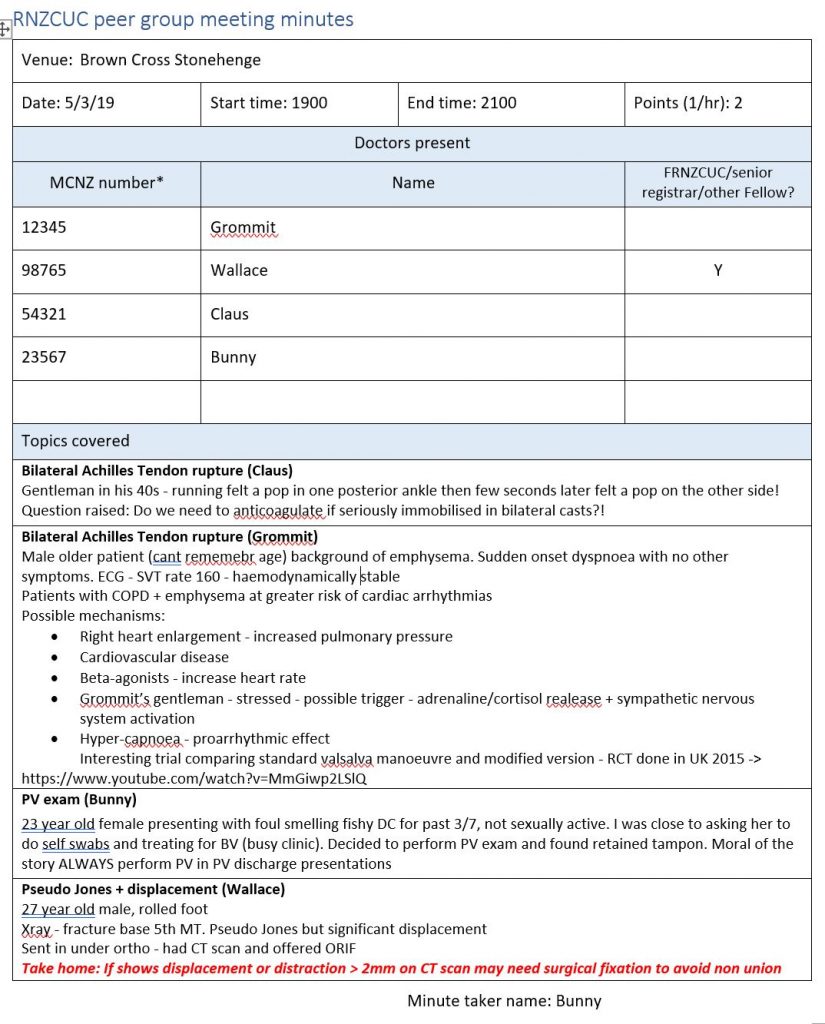Description and purpose
Peer review groups meet regularly to discuss case management and clinical problems, with the aim of improving the performance of individuals within the group.
CPD requirement
A minimum of 5 meetings totalling at least 10 hours per year.
Rules
- At least three doctors will be present and participating.
- At least one person present will be an RNZCUC Fellow or senior registrar. The Education Committee may waive this rule for registrars working in a location where a RNZCUC Fellow or senior registrar is not available.
- The group discusses urgent care cases or clinical challenges with the aim of improving clinical performance.
RNZCUC accepts video conference peer group meetings but prefers face-to-face meetings.
Peer review must take place in an environment conducive to the confidentiality of the patients being discussed, and the privacy of the doctor whose work is being reviewed.
Examples
As long as the rules above have been satisfied, examples of peer review might include:
- difficult or interesting cases
- learning points from the training programme
- journal articles relevant to a recent case
- joint review of cases
- review of charts
- critique of a video review of consultation.
For clinicians, peer review does not include:
- practice management
- matters relating to practice premises or systems
- non-clinical research
- non-clinical education
- participation on college or other committees that are not of a clinical nature
MCNZ Requirement
The MCNZ requirements for peer review are available in this document.
Finding a peer group
Check first with supervisor for their recommendation for a peer group.
A list of peer groups in NZ is available here.
When access to an RNZCUC Fellow or senior registrar is not possible, registrars should communicate with the Director of Clinical Training to seek dispensation.
Peer group coordination
If setting up a peer group, please inform the College, who will add your name to the list of peer groups in NZ. When organising a group, the College recommends appointing a coordinator (not necessarily the Fellow/senior registrar) to act as a point of contact, to arrange appropriate venues and meeting dates, and to organise the peer group event (or to arrange for members of the peer group to take the lead in organising an event).
When informing the College, please provide the following information:
- Peer group location: City and suburb
- Contact person name, email, mobile number
(We will add these details to the list of peer groups. You can request that your contact details are not included in the table, in which case we will name the office as contact person. We would provide your contact details (name, email) only when a registrar asks for the contact details of your peer group).
Getting the most from the peer group
Many doctors report that the best discussions only eventuate after several meetings, when participants become comfortable with the group and feel free to be frank. Some keys to facilitating this atmosphere are:
- An attitude that all members of the group are equals (peers).
- No direct criticism or threatening attitudes.
- Keep time limits.
- Encourage participation by all members.
- Encourage and plan for socialisation. The end of the meetings is a good time for this.
Guidance on peer review in ED
Any RNZCUC registrar working in an ED with no RNZCUC Fellow or senior registrar should first seek dispensation.
ED often run training events or symposia with multiple foci. Peer review may be part of this. If the event includes feedback, guidance, or critique of your clinical performance and is in a group format, it may be classed as peer review for the purposes of RNZCUC recertification. Record your peer review activities on ePortfolio using the template below.
Examples of ED activities include:
- Those listed above
- interactive radiology conferences
- mortality and morbidity meetings.
Otherwise, it may be claimed as a CME activity. Whichever option you choose, you cannot claim both peer review and CME points for the same activity (ie no “double dipping”).
13 February 2026Recording
Nominate one person to be responsible for writing minutes and sharing them with everyone present. An example of meeting minutes is shown below. This table can be downloaded as a word document here.
RNZCUC allocates points for interaction time only, not preparation.
Currently (March 2019) individuals enter their peer group activity on their personal ePortfolio. RNZCUC has requested a tool to allow minutes to be uploaded to ePortfolio, in the meantime individuals should keep a copy of the minutes in case of audit.

